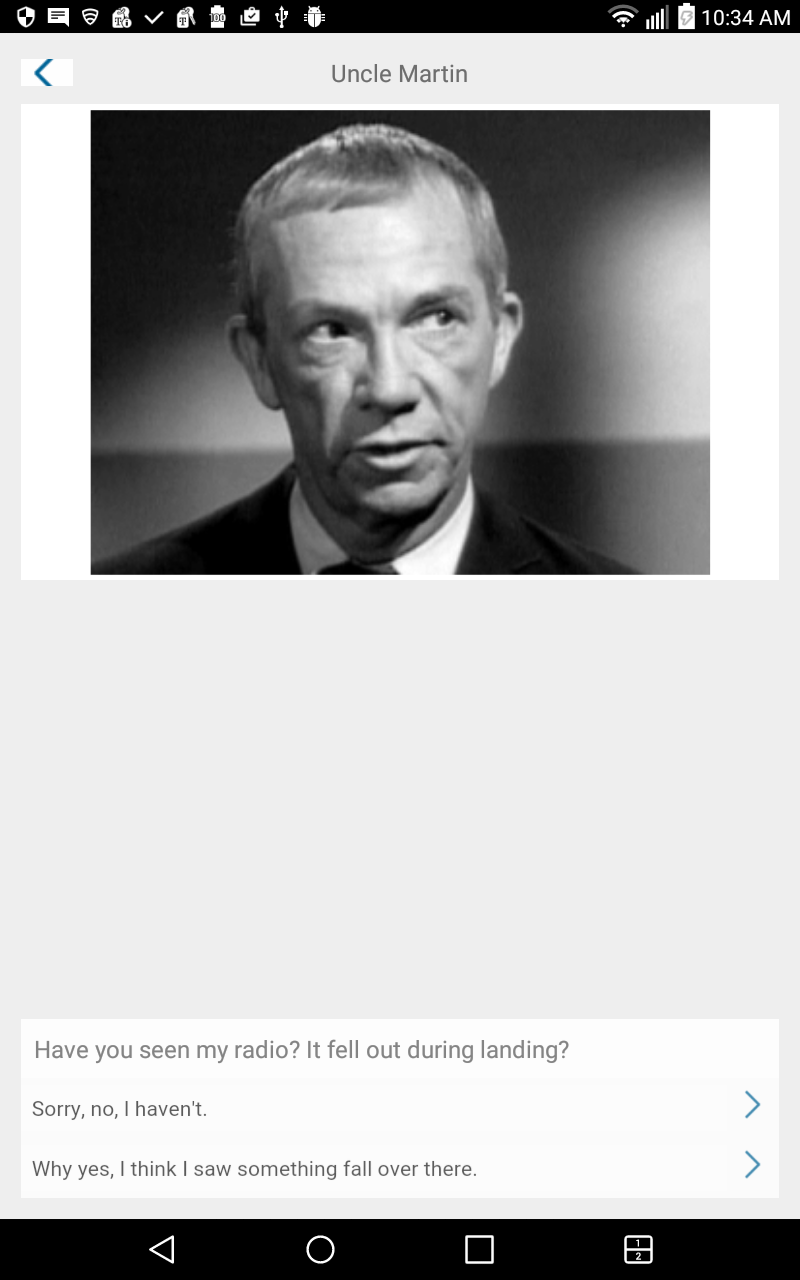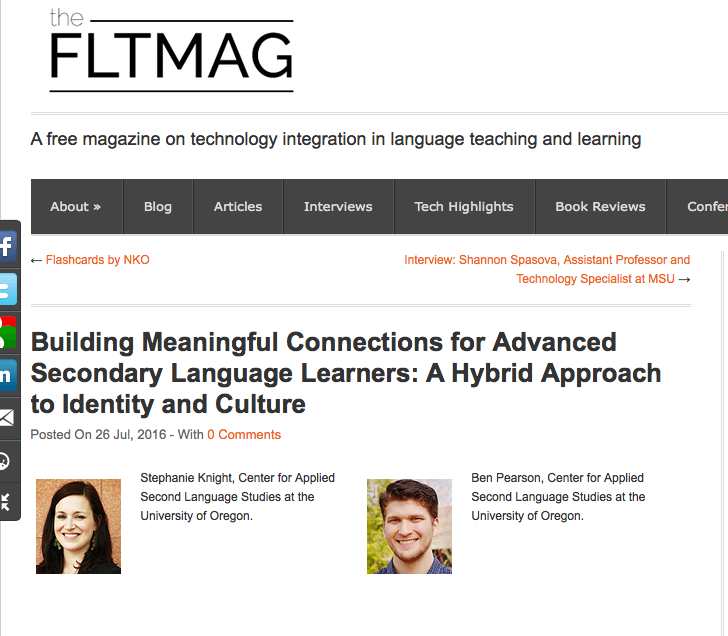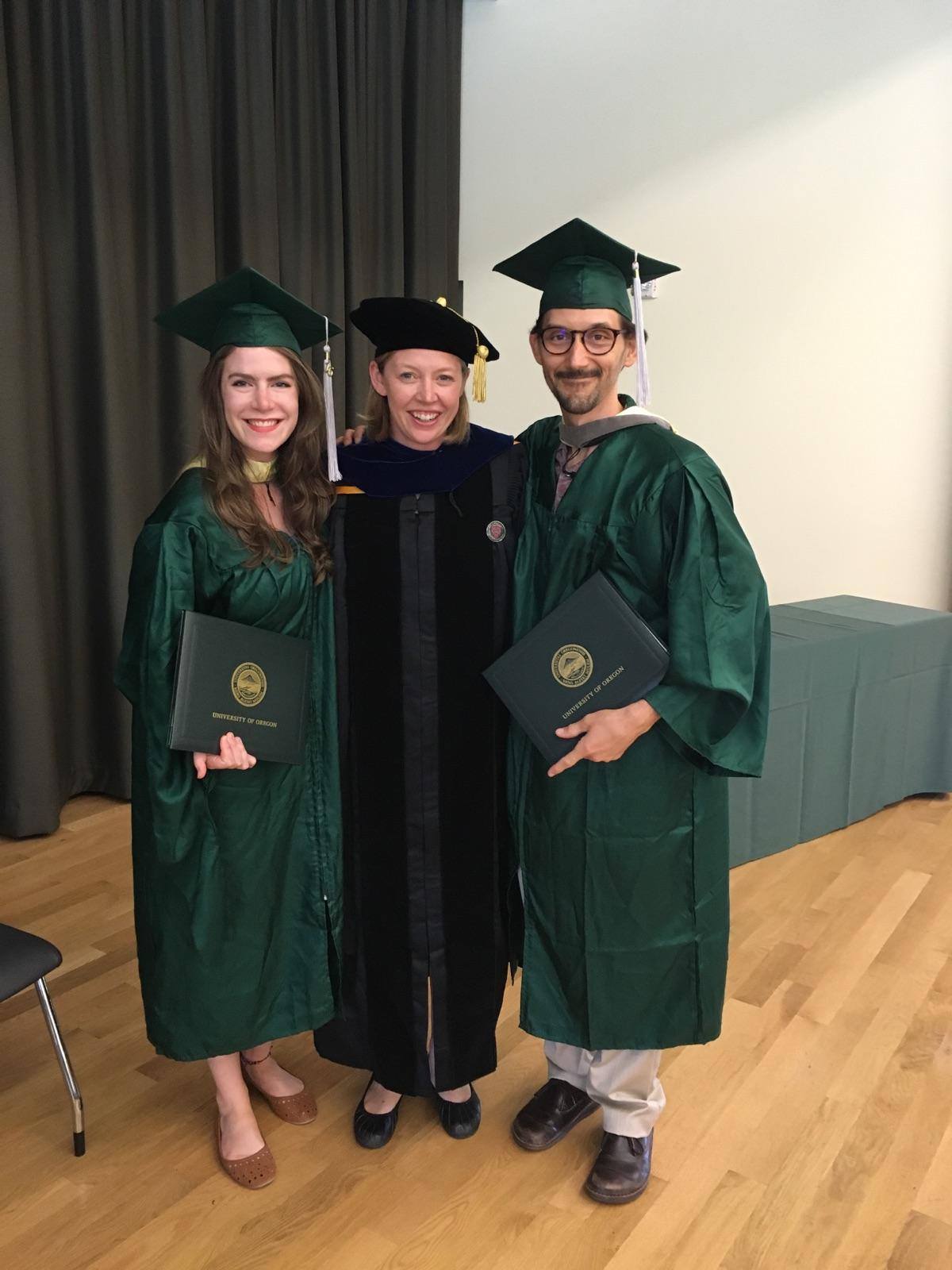Contents
Content Type: 5
Title: ARIS for Android
Body:
ARIS, an open-source platform for creating and playing place-based mobile games, is currently available for iOS devices, but not for Android. CASLS’ Educational Software Engineer Scott Morison has been working on an ARIS for Android, which is now able to play basic single conversation games, such as in the photo below. 
Learners can choose how they want to respond to conversational choices in the game, which triggers different paths and further choices based on their previous selections.
The process of creating an Android version involves going through the background structure of the iOS and then translating it to Android, going from Objective C (iOS) to Java (Android) code. “The inner brain is all there and working now, it’s just adding in other pieces,” Scott says as he works on the map function.
ARIS can be used by language teachers to create place-based games and to have students play games, which can be surrounded by classroom activities and discussions as part of the language curriculum. Having ARIS available on not only iOS but also Android opens this possibility up to more people.
For more information on ARIS visit the ARIS website. For more information about using games, such as those made with ARIS, for language teaching visit the Games2Teach website.
Source: CASLS Spotlight
Inputdate: 2016-08-16 09:40:22
Lastmodifieddate: 2016-08-29 02:55:02
Expdate:
Publishdate: 2016-08-29 02:15:01
Displaydate: 2016-08-29 00:00:00
Active: 1
Emailed: 1
Isarchived: 0
Content Type: 5
Title: Farewell to the First Oregon Summer Program Cohort
Body:
CASLS just said goodbye to our first cohort of the Oregon Summer Program (OSP) with a farewell party held on Friday, September 23.
The Oregon Summer Program is a four-week program designed to help students from Japanese universities learn about topics related to sustainability and health and explore American university life while connecting with the culture and people of Oregon.
East Asia Programs Director Li-Hsien Yang provides daily academic, organizational, curricular and life support for the students during their time here, and Digital Technologies Associate Ben Pearson creates and leads place-based curriculum for the program, with activities involving Ingress, Chrono Ops, and EcoPod: Quake Response. Renée Marshall, International Programs Specialist, offers English language support with focused ESL lessons at the beginning of each week to help students practice the language and vocabulary they will be using during that week. During the fourth week students also complete four days of volunteer work for local organizations.
Please join us in wishing the OSP students best of luck in their future endeavors! For more information about the Oregon Summer Program visit the website.
Source: CASLS Spotlight
Inputdate: 2016-08-16 14:25:53
Lastmodifieddate: 2016-09-26 03:34:14
Expdate:
Publishdate: 2016-09-26 02:15:01
Displaydate: 2016-09-26 00:00:00
Active: 1
Emailed: 1
Isarchived: 0
Content Type: 3
Title: Peer Review: The First Step Toward Meaningful Self-Assessment
Body:
by Stephanie Knight, CASLS Language Technology Specialist
It is unlikely that learners will be able to engage in adequate self-assessment without first evaluating the work of others. Such evaluations are particularly useful in developing skills in both Presentational Writing and Presentational Speaking. While these forms of communication are unidirectional, they do engender interaction. For example, Fulcher (1998) discusses Widdowson’s (1983) discourse model of communicative competence and performance by explaining that readers are confronted with the task of deciphering the illocutionary intent of writers; essentially there is a type of internal discourse in which the receivers of a message question and interact with texts in order to (hopefully) understand the intended messages of their authors.
It is logical then that learners who are writers get feedback from other readers and that learners who are speakers get feedback from their audiences when learning and perfecting said crafts. Brown (2005) points out that one valid approach to teaching writing is to have learners engage in evaluation of their peers. After all, she discusses, educators (examiners and teachers) are often trained to evaluate learners by working with annotated texts in order to ensure the appropriate interpretation of such evaluative tools as rubrics. It would be logical to extend that training to learners.
In Brown’s small-scale study of how training in peer review parlayed into effective learner self-evaluation, some important characteristics of effective peer review were crystalized. These characteristics are explained below.
Train learners to annotate texts: This training may certainly focus on syntactic variables, but it should also focus on annotating characteristics within a text related to meaning making (e.g., discourse markers, supporting details, and voice). It is also important during this training to break down the academic vocabulary (terms such as “modal” or “passive voice”) that learners will need to negotiate with when making annotations.
Consider learners’ proficiency levels: It is difficult for learners at low proficiency levels to annotate texts that they do not understand. Brown (ibid.) recommends that learners be paired or grouped by proficiency level so that they are able to fully engage in the text(s) that are being evaluated. If the makeup within a classroom prevents such a grouping, a possible solution would be to have learners annotate one characteristic of a text in lieu of the text in its entirety.
Group learners according to relative strengths and weaknesses: Brown (ibid.) discusses an exit interview in which one study participant indicated that it was difficult transfer skills from engaging in peer review to self-evaluation because she was not paired with someone whose strengths and weaknesses were reflected in her own work. While ideal groupings are impossible to achieve at the beginning of an academic term, educators are encouraged to be intentional when creating groups once they get to know each individual’s strengths and weaknesses.
Teaching a person to do for his or her self is much more beneficial than doing for him or her. In kind, our job as educators is not only to give feedback to learners, but to also to empower learners to evaluate themselves. Training learners in effective peer review is the first step to emboldening learners to do just that.
References
Brown, A. (2005). Self-assessment of writing in independent language learning programs: The value of annotated samples. Assessing Writing. 10. 174-191.
Fulcher, G. (1998). Widdowson’s model of communicative competence and the testing of reading: An exploratory study. System. 26. 281-302.
Source: CASLS Topic of the Week
Inputdate: 2016-08-16 15:56:23
Lastmodifieddate: 2016-08-22 03:33:38
Expdate:
Publishdate: 2016-08-22 02:15:01
Displaydate: 2016-08-22 00:00:00
Active: 1
Emailed: 1
Isarchived: 0
Content Type: 4
Title: Peer Review for a Video Project
Body:
by Stephanie Knight, CASLS Language Technology Specialist
This activity was created for Intermediate High language learners enrolled in an online class.
Learning Objectives: Students will be able to
- Recognize supporting details
- Provide feedback to a peer regarding supporting details
Modes: Presentational Speaking
Materials Needed: Student-created promotional videos, Handout, Rubric
Procedure:
- Learners must create a promotional video for an upcoming festival in their towns, taking care to include enough supporting details so that anyone viewing the video is able to make a plan to attend the festival.
- Learners will review the work created by at least one other person in the class. It is important that the work be comprehensible to the reviewer; take care to ensure that learners are grouped according to proficiency level.
- Peer reviewers will look for evidence regarding the detailed and descriptive nature of the videos created by their peers. In order to do so, they will use the handout. If you have not done so before, it is important to model appropriate evaluation of a similar text for learners.
- To wrap up their evaluations, learners will use a rubric for presentational communication to evaluate the work of their peers. They must make sure to justify each score that they grant with specific evidence from the videos that they reviewed. If you have not already done so, it is important to take time to help learners to understand the expectations put forth by the rubric; break apart any academic language and provide examples of student-created material that would score well.
Notes: This activity was originally created for an online class but could easily be adapted to face-to-face contexts. For examples, learners could upload their videos to Google Drive or a course management system such as Blackboard or Canvas.
Source: CASLS Activity of the Week
Inputdate: 2016-08-16 17:04:48
Lastmodifieddate: 2016-08-22 03:33:38
Expdate:
Publishdate: 2016-08-22 02:15:01
Displaydate: 2016-08-22 00:00:00
Active: 1
Emailed: 1
Isarchived: 0
Content Type: 5
Title: Bridging Identity and Culture Project Highlighted in FLTMAG
Body:
FLTMAG ran an article by CASLS’ Language Technology Specialist Stephanie Knight and Digital Technologies Associate Ben Pearson on July 26 highlighting the exciting Bridging Project.

CASLS has been collaborating with Portland Public Schools to develop a hybrid online language course, called Bridging Identity and Culture. The pilot course is now underway. The course is currently available for advanced Chinese learners with plans to expand the offerings to Spanish and Russian learners the following school year. The Bridging Project initiative came out of an attempt to reach advanced and heritage learners at the secondary level. The needs of these students have historically been underserved in traditional language courses at the secondary level and thus the language class dropout rate for this population is high. This course is hoping to reach these students, being a “bridge” to keep them involved in language learning throughout high school and beyond.
To read the full article in FLTMAG, click here. For more information on the Bridging Project see CASLS’ website and a past InterCom spotlight.
Source: CASLS Spotlight
Inputdate: 2016-08-17 12:02:05
Lastmodifieddate: 2016-09-19 03:36:47
Expdate:
Publishdate: 2016-09-19 02:15:01
Displaydate: 2016-09-19 00:00:00
Active: 1
Emailed: 1
Isarchived: 0
Content Type: 2
Title: Congratulations LTS Graduates
Body:
 Congratulations to the LTS graduates, who celebrated finishing their MA program last Saturday! Here is a picture from graduation of CASLS GTFs Kathryn Carpenter and Christopher Daradics with LTS faculty and CASLS director Julie Sykes.
Congratulations to the LTS graduates, who celebrated finishing their MA program last Saturday! Here is a picture from graduation of CASLS GTFs Kathryn Carpenter and Christopher Daradics with LTS faculty and CASLS director Julie Sykes.
Source: CASLS
Inputdate: 2016-08-18 07:40:39
Lastmodifieddate: 2016-08-22 03:33:38
Expdate:
Publishdate: 2016-08-22 02:15:01
Displaydate: 2016-08-22 00:00:00
Active: 1
Emailed: 1
Isarchived: 0
Content Type: 5
Title: Resources from the Language Teaching Specialization Program
Body:
In addition to the employment crossover between the Language Teaching Specialization (LTS) MA program and CASLS, like CASLS, LTS provides resources for current language teachers and the teaching and learning community in general. In the local community, LTS collaborates with Lane Community College to offer LTS students internships that help LCC develop their curriculum on digital literacy. In addition, LTS supports Mandarin language learning by providing a Chinese language and culture club at Edison Elementary. LTS also provides career training (https://oregonlts.obaverse.net/welcome/) where teachers and future teachers can interact with sample interviews and employment-related situations, and can analyze and practice what makes a strong language teaching candidate. This service is open to all language teachers.
These initiatives go hand in hand with the mission of CASLS to promote teacher professional development, K-12 world language learning, and connections across higher education institutions.
Source: CASLS
Inputdate: 2016-08-18 08:39:50
Lastmodifieddate: 2016-08-22 03:33:38
Expdate:
Publishdate: 2016-08-22 02:15:01
Displaydate: 2016-08-22 00:00:00
Active: 1
Emailed: 1
Isarchived: 0
Content Type: 1
Title: Call for Papers: American Association of Teachers of Slavic and East European Languages - Wisconsin Conference
Body:
From http://slavic.lss.wisc.edu/new_web/?q=node/7
AATSEEL-Wisconsin Conference
October 7-8, 2016
University of Wisconsin-Madison
Abstracts for 20-minute papers on any aspect of Slavic literatures, cultures (including film, music, and the visual arts), linguistics, and history are invited for the annual conference of the Wisconsin chapter of AATSEEL (The American Association of Teachers of Slavic and East European Languages). Comparative topics and interdisciplinary approaches are welcome and encouraged.
To present a paper at the AATSEEL-WI conference, please submit a proposal by August 31, 2016.
For more information about the conference go to http://slavic.lss.wisc.edu/new_web/?q=node/7
Download the full call for papers from http://slavic.lss.wisc.edu/new_web/sites/slavic.lss.wisc.edu.new_web/files/AATSEEL%20WI%20Call%20for%20Papers%202016.docx
Source: AATSEEL-Wisconsin
Inputdate: 2016-08-21 15:05:35
Lastmodifieddate: 2016-08-22 03:33:38
Expdate: 2016-08-31 00:00:00
Publishdate: 2016-08-22 02:15:01
Displaydate: 2016-08-22 00:00:00
Active: 1
Emailed: 1
Isarchived: 0
Content Type: 1
Title: Call for Papers: ComputEL-2: Workshop on Computational Methods for Endangered Languages
Body:
From http://altlab.artsrn.ualberta.ca/computel-2/
ComputEL-2
A Workshop on Computational Methods for Endangered Languages
Honolulu, Hawaii, March 6-7, 2017
The ComputEL-2 workshop will focus on the use of computational methods in the study, support, and revitalization of endangered languages. The primary aim of the workshop is to continue narrowing the gap between computational linguists interested in working on methods for endangered languages, field linguists working on documenting these languages, and the language communities who are striving to maintain their languages.
ComputEL-2 will immediately follow the International Conference on Language Documentation and Conservation (ICLDC) hosted by the University of Hawaii, March 2-5, 2017.
Papers are invited which explore the interface and intersection of computational linguistics, documentary linguistics, and community-based language revitalization efforts. The committee encourages submissions which:
(i) examine the use of specific methods in the analysis of data from low-resource languages, with a focus on endangered languages, or propose new methods for analysis of such data,
(ii) propose new models for the collection, management, and deployment of data in endangered language settings, or
(iii) consider what concrete steps are required to allow for a more fruitful interaction between computer scientists, documentary linguists, and language communities.
The intention of the workshop is not merely to allow for the presentation of research on these topics, but also to continue building a network of computational linguists, documentary linguists, and community language activists who are able to effectively join together to serve their common interests.
Paper/abstract submission deadline: October 1, 2016
View the full call for papers at http://altlab.artsrn.ualberta.ca/computel-2/
Source: Alberta Language Technology Lab
Inputdate: 2016-08-21 15:07:27
Lastmodifieddate: 2018-10-14 21:11:28
Expdate: 2016-10-01 00:00:00
Publishdate: 2016-08-22 02:15:01
Displaydate: 2016-08-22 00:00:00
Active: 1
Emailed: 1
Isarchived: 0
Content Type: 1
Title: La Cosecha Dual Language Conference
Body:
From http://information184.wix.com/lacosecha
La Cosecha Dual Language Conference
November 9-12, 2016
Santa Fe, New Mexico
Embracing our Roots — Fortaleciendo nuestra comunidad bilingüe
La Cosecha 2016 will bring together educators, parents, researchers and practitioners supporting dual language enrichment programs from across the U.S. La Cosecha offers you the unique opportunity to share best practices and resources, current theory and practice, build networks, and fuel our community's efforts to build a better future for our children as we “harvest” the best of our multilingual and multicultural communities.
La Cosecha began in 1996 with 80 teacher volunteers who recognized a need to network and share identified best practices within the dual language community. La Cosecha 2016 will bring together over 2,500 participants from throughout the U.S., representing two-way immersion, one-way developmental bilingual, and one-way heritage language immersion programs.
Learn more at the conference website: http://information184.wix.com/lacosecha
Source: Dual Language Education of New Mexico
Inputdate: 2016-08-21 15:09:23
Lastmodifieddate: 2016-08-22 03:33:38
Expdate: 2016-11-12 00:00:00
Publishdate: 2016-08-22 02:15:01
Displaydate: 2016-08-22 00:00:00
Active: 1
Emailed: 1
Isarchived: 0
